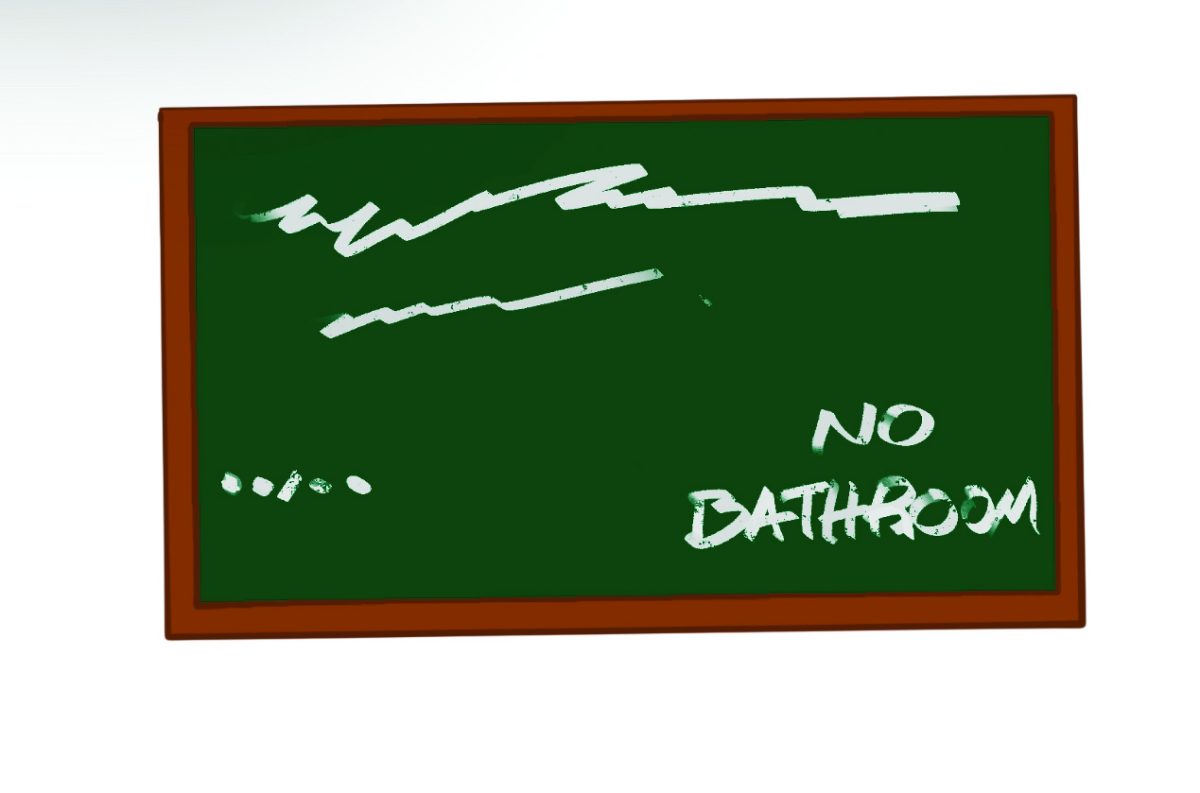AP Government teacher George Dremousis makes it a priority to keep himself informed, particularly today with the presidential campaigns of candidates such as Donald Trump and Hillary Clinton.
“I tend to read five newspapers every single day. I try to watch one local news, one nightly newscast every night,” he said.
Dremousis continued, listing off PBS, NBC, the Huffington Post, the New York Times, the Washington Post, FOX and CNN as some of his favored news sources. He further acknowledged the students in his AP class, saying they’re similarly conversant with current politics.
What Dremousis doesn’t mention are social media platforms such as Twitter, Facebook or Instagram. Instead, he cites a 2013 statistic from the Pew Research Center that claimed 65 percent of young people under 30 use the Internet as their sole source of information.
“On the Internet, anyone can be anyone,” Dremousis said. “You watch a TV show or read a New York Times or an L.A. Times, at least there’s the idea that these people are somewhat reputable, that they’re career people, that they have some education, some training. On the Internet, anyone can come across as an expert anything, and you just don’t know who it is.”
Freshman Sam Schippers is one of many using social media for political information.
“I follow a lot of the candidates on Twitter so I’m usually kept up with their evolving opinions and statements,” he said. “If I see something like a quote or an idea that a candidate has sent out and [if] it catches my eye then I will dive deeper into it.”
His account is one of 289 million active on Twitter, compared to the more than 182 million users on Instagram and Facebook’s 1 billion-plus users.
In a research survey conducted in March 2015, the American Press Institute (API) and the Associated Press – NORC Center for Public Affairs Research found that 88 percent of millennials use Facebook as a news source. In addition, the API found 69 percent of individuals who are ages 18 to 34 receive news on a daily basis.
However, a University of Hawaii (UH) study from August 2015 surveyed 70 students in efforts to understand the impressions political candidates leave on millennials. The survey found that most millennials tend to “stumble upon political information rather than seek it out,” but the result occurred regardless of whether interactions were online or in person.
While Schippers doesn’t believe politics is something he’s acutely well-informed in, he does believe that social media can have other effects on young people.
“Social media at this point has almost everything to do with student misconceptions. The media has portrayed many events in government as a joke or something to laugh at,” Schippers said.
Newly elected Executive ASB President Hani Nakkour, a frequent user of Twitter for political news similar to Schippers, recognized the influence of Twitter on the race.
“The retweet is so important. I usually don’t follow most of these people, but other people that do retweet it and you get to see it and it just keeps me updated,” he said.
Youth aren’t the only ones using social media for politics. Presidential candidates use social media to gain momentum among young people.
T Statman, a blogger with the Huffington Post, wrote an article in August 2015 about the importance of young adults during voting season.
“The saying goes ‘a way to a man’s heart is through his stomach,’” Statman said. “In politics, the saying should be ‘a way to the youth vote is through social media.’”
In 2011, Social Media Explorer (SME Digital) CEO Nichole Kelly wrote a blog post concerning the presidential campaign and addressed President Barack Obama’s use of social media as a part of his 2012 campaign.
“I’m seeing more politicians use social media as another PR or marketing channel, rather than using it to open the floor for conversation and I think this is a missed opportunity,” Kelly said. “It is also slightly disheartening that for those who are using social media that ‘staffers’ are running the channels and it’s unclear if the politicians have any involvement.”
While use of social media by presidential candidates is happening more frequently during the current election, some still agree with Kelly.
Nakkour criticized Republican presidential candidate Donald Trump’s use of Twitter, for example.
“His Twitter is just… His responses to people are very harsh, and it’s kind of rude and I mean if [a person is] going to be running for something, you can’t have this kind of attitude towards people and responding really negatively,” he said.
Nakkour explained that a candidate’s Twitter account should have a professional character to reflect their personality.
“I think that it’s doing a disservice to our political system, the way they’re personally attacking each other on social media,” Dremousis said. “I think our politicians should rise above that.”
Dremousis pointed out multiple misconceptions concerning Trump and Democratic presidential candidate Bernie Sanders.
“When you hear Donald Trump talking about deporting illegal immigrants, that’s not gonna happen. When you hear Bernie Sanders talking about free college tuition and a single payer health care system, you know, that’s not gonna happen,” he said. “But, people want to believe it so badly that they get behind them and that they’re either uninformed or they get caught up in the fervor so they vote on that.”
Dremousis also pointed out that the media propels comparisons of Donald Trump to Adolf Hitler and statements that Sanders is a communist, yet again feeding people’s misconceptions.
Whereas Dremousis noted the misconceptions of the general public, Schippers recalled more local instances of mistaken beliefs.
“[I have] heard some students say some pretty dumb things. I’ve heard students say they want a certain candidate to win just to see what happens. But I don’t want to say I’m any smarter than they are, so I try not to correct them because politics is all opinion based,” Schippers said.
It’s not just students who are sharing their misconceptions about the political race and candidates.
The Washington Post and Politico are two of multiple media outlets that have published articles debunking claims the presidential candidates have made. In 2015, Glenn Kessler of the Washington Post published an article “The biggest Pinocchios of 2015” and found that the presidential race took up most of his list.
“Most politicians drop a claim after it has been fact-checked as false. But Trump is unusual in that he always insists he is right, no matter how little evidence he has for his claim,” Kessler said, targeting Trump. “Frankly, it’s really not interesting to fact check [Donald Trump], as his assertions are so easily debunked,” he said.
Kessler referenced each time Trump claimed that he saw “thousands of Muslims in New Jersey cheer as the World Trade Center fell” and when Democratic frontrunner Hillary Clinton defended her husband for signing the anti-gay Defense of Marriage Act.
Politico’s “Wrongometer” analyzed several Republican and Democratic debates, finding more than a few statements incorrect. When Ted Cruz claimed that ending sugar subsidies would assist in military funding on November 10 of last year and Bernie Sanders said financial institution Goldman Sachs was engaging in illegal activity on March 9, Politico proved them both wrong.
However, the largest impact on the race comes from the voters, and some like Statman believe the youth are the ones who can propel the race.
One statistic Statman gives concerns youth voter turnout numbers from the Center for Information and Research on Civic and Learning Engagement.
“Those young and registered to vote also have high turnout numbers that are at about 84 percent, but overall as a whole that makes up for roughly 45 percent of the total youth eligible to vote. Potentially, with enough voter turnout, the youth could be the swing vote for an election,” Statman said.
Mountlake Terrace City Council Member Laura Sonmore said while trusting in the youth, implied that the future may not be as bright as it was before.
“Seattle used to be the ‘Emerald City’ for Washington and I think we’re becoming the rusty city,” Sonmore said.
“[Youth] can really influence the future of Washington,” Sonmore said, emphasizing the local impact all students have.
Dremousis reiterates the importance of students in politics.
“You guys are the next generation, you’re the wave of the future. At my age, I’m almost 50, the future’s in the next generation’s hands. We’d like to believe you’re making educated and informed opinions,” Dremousis said.
Sonmore also encouraged students to attend council meetings.
“People don’t realize what the council can do,” she said. “Locally, the council can raise taxes, implement ordinances and laws within like a curfew.”
Rock the Vote works to get eligible students registered and ready to vote when the time comes on a national scale. With support from current pop culture standouts like John Legend and Ariana Grande, millions of youth have been registered through the organization’s online registration.
Voting is not a requirement or a federal law, but a right, as Schippers emphasized. He also said that he intends to vote when he turns 18.
“I care about America a lot. It’s not the greatest country in the world at all. But it has potential to be something memorable again,” Schippers said. “I believe that we can make the right decisions together if we focus more on being together.”
Dremousis stressed the gravity of informing yourself on all sides of an issue using reliable sources.
“Look at not just one or two sides, look at a variety of sides. Try to go to reputable news agencies, the big ones CNBC, MSNBC, CBS, FOX, Huffington Post; you want something established. And then you try to make an opinion not based on emotion but on what’s realistic, the facts and statistics,” Dremousis said.
Nakkour also encouraged students to put forth more effort into involving themselves with the presidential race.
“I would like to see more action [from people]. People are saying a lot of things, but they’re not actually doing it,” he said.
Although Nakkour is unable to vote for this year’s election, he said he’s encouraging his mom to vote despite her and other immigrants not seeming to care.
“[Cultures] that [care], like some Mexican-Americans and African-Americans, they all involve themselves because it is affecting them and I do really like seeing that,” Nakkour said. “[It’s] nice to see that they’re actually taking a stand because it’s not like standing back, but I also feel like different cultures that are not affected by this should be involved also, because it’s not just affecting other cultures, it’s them too.”





